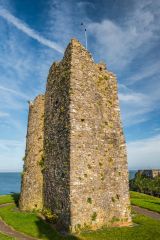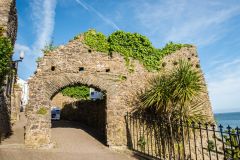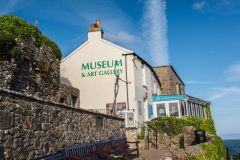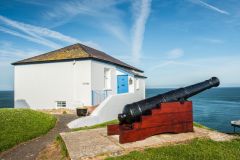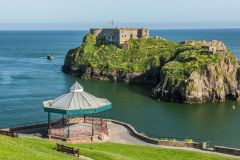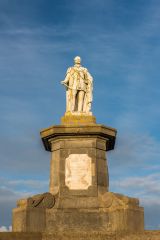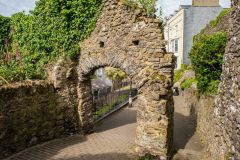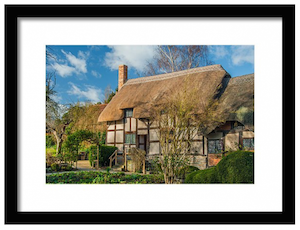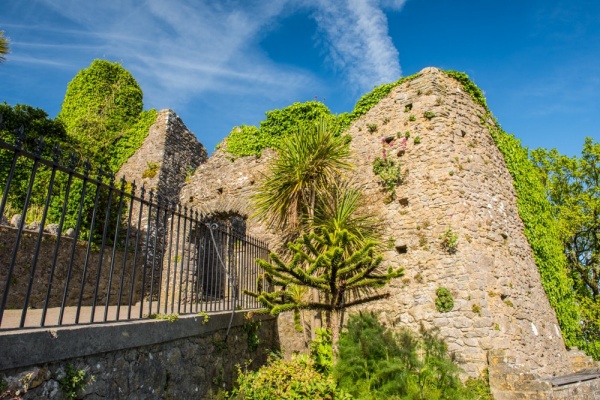
High on a hill above Tenby harbour stand the remains of 13th century castle walls along with a ruined gate and tower. The first castle here was built by an unknown Norman lord sometime before 1153, when it was captured by the Welsh under Lord Rhys. That first castle was defended by earthen banks and ditches. It may stand on the site of a yet earlier castle founded by the Welsh in the 9th century.
The castle was built on a promontory joined to the mainland by a narrow neck of land, and linked to the medieval town walls. The most prominent features of the castle are the D-shaped gatehouse, with barbican defences, and the stump of a stone keep with a stair turret.
The castle defences were strengthened in 1377, but just 9 years later an enquiry found the fortress suffering from neglect, with work needed on the roof timber and leading. It seems efforts to maintain the castle were sporadic at best.
During the Civil War the castle was held by a band of Royalist soldiers for 10 weeks. The Royalists were starved into submission by Parliament.
In 1832 one of the medieval residential buildings beside the gatehouse was transformed into a National School. The building was enlarged a decade later, but closed in 1874. In 1878 the school building was altered once more to serve as the Tenby Museum and Art Gallery. The museum boasts displays on the archaeology, geology, maritime, and natural history of the Tenby area, plus local art and exhibits relating to the Castlemartin (Pembrokeshire) Yeomanry.
In 1865 the space within the castle was drastically altered when an imposing statue of Prince Albert was added at its highest point. Prince Arthur, eldest son of Prince Albert and Queen Victoria, unveiled the statue on 2 August 1865. Just beyond the statue is the Watchtower, built in the 13th century. This consists of a round tower linked to a later staircase tower. It was used by the Admiralty for many years but is now home to a Met Office weather station.
The castle remains include the smallest 'great tower' of any castle in Wales, and may have been inspired by the great tower at Pembroke Castle. Only small sections of the castle walls remain intact. On the north side is a small stretch of wall with medieval arrow slits and a section of the wall walk. You approach the castle through a very simple gate through the curtain wall, defended by a small barbican, leading to the museum.
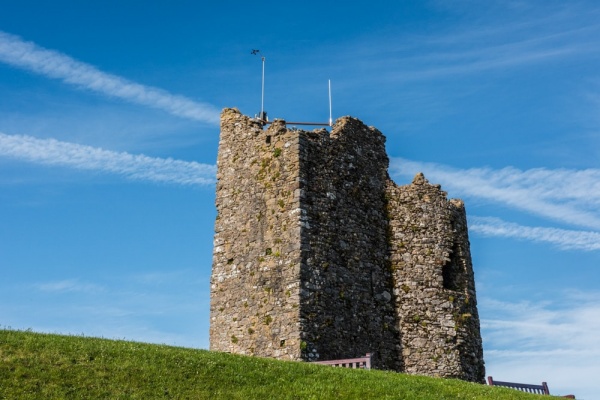
Also on Castle Hill is The Old Coastguard House, built in the early 19th century as a coastguard station. There are also several old cannons on Castle Hill. These originally formed part of the town defences. They were restored and remounted in the 1960s by the Royal Regiment of Artillery and the Corps of Royal Electrical and Mechanical Engineers from the School of Artillery at Manorbier.
From the late 18th century Castle Hill was a fashionable area for Tenby natives and visitors to promenade and take the views. From 1897 they could also listen to open-air concerts from the Bandstand. The original bandstand was dismantled so its metal could be used for the WWII war effort. It was restored in 1991.
The Town Walls
Tenby's medieval walls are very well preserved, and indeed may be considered of greater historical interest than the rather scanty castle ruins.
Tenby was sacked by Rhys's son Maelgwyn in 1187, and again by Llewelyn ap Gruffudd in 1260. To add an extra measure of defence the extensive town walls were built by the Norman lord William de Valence. The walls served their purpose, saving Tenby from an attack by Owain Glyndwr's French allies in 1405.
In 1873 the town council wanted to pull down the medieval walls, but were prevented by the efforts of a certain Dr Chater. As a result, we can get a good idea of what most Welsh medieval town walls would have looked like (leaving aside the very grand and extensive walls at major centres like Caernarfon and Conwy).
Castle Hill is very easy to reach from the harbour and is well signposted from around the town. There is no parking on the site, but there are several pay and display parking areas near the harbour.
About Tenby Castle
Address: Castle Hill,
Tenby,
Pembrokeshire,
Wales, SA70 7BP
Attraction Type: Castle
Location: in Tenby (A478/B4585) on a rocky headland
Website: Tenby Castle
Location
map
OS: SN131 008
Photo Credit: David Ross and Britain Express
Opening Details: Open access site, usually accessible at any reasonable time
POPULAR POSTS
HERITAGE
 We've 'tagged' this attraction information to help you find related historic attractions and learn more about major time periods mentioned.
We've 'tagged' this attraction information to help you find related historic attractions and learn more about major time periods mentioned.
Historic Time Periods:
Find other attractions tagged with:
13th century (Time Period) - 18th century (Time Period) - 19th century (Time Period) - 9th century (Time Period) - castle (Architecture) - Civil War (Architecture) - Llewelyn ap Gruffudd (Person) - Lord Rhys (Person) - Medieval (Time Period) - Norman (Architecture) - Owain Glyndwr (Person) - Queen Victoria (Person) - round tower (Architecture) - Royalist (Person) -
NEARBY HISTORIC ATTRACTIONS
Heritage Rated from 1- 5 (low to exceptional) on historic interest
Tenby, St Mary's Church - 0.2 miles (Historic Church) ![]()
Tenby Medieval Town Walls - 0.2 miles (Historic Building) ![]()
Tudor Merchant's House - 0.3 miles (Historic House) ![]()
Tenby Museum & Art Gallery - 0.4 miles (Museum) ![]()
Penally, St Nicholas & St Teilo Church - 1.3 miles (Historic Church) ![]()
Carswell Medieval House - 2 miles (Historic Building) ![]()
Caldey Island Priory - 2.6 miles (Abbey) ![]()
Caldey Island, St David's Church - 2.7 miles (Historic Church) ![]()
